Effective Strategies for Teaching Coding Without Computers Research
VerifiedAdded on 2022/11/26
|10
|2847
|163
Report
AI Summary
This research paper investigates the feasibility and effectiveness of teaching coding to students without the use of computers in educational settings. It explores various tools, theories, and strategies, including hands-on activities like games and binary code exercises, to make coding more accessible and engaging. The study employs both inductive and deductive research approaches, utilizing surveys and interviews for data collection. The literature review examines how students can learn coding fundamentals, logical thinking, and problem-solving skills without computers. The research design, including data collection methods, limitations, ethical considerations, and potential impacts, is thoroughly discussed. The findings emphasize the importance of alternative methods to bridge the gap between traditional teaching and creative learning approaches, ultimately aiming to provide effective ways for schools and institutions to teach coding.
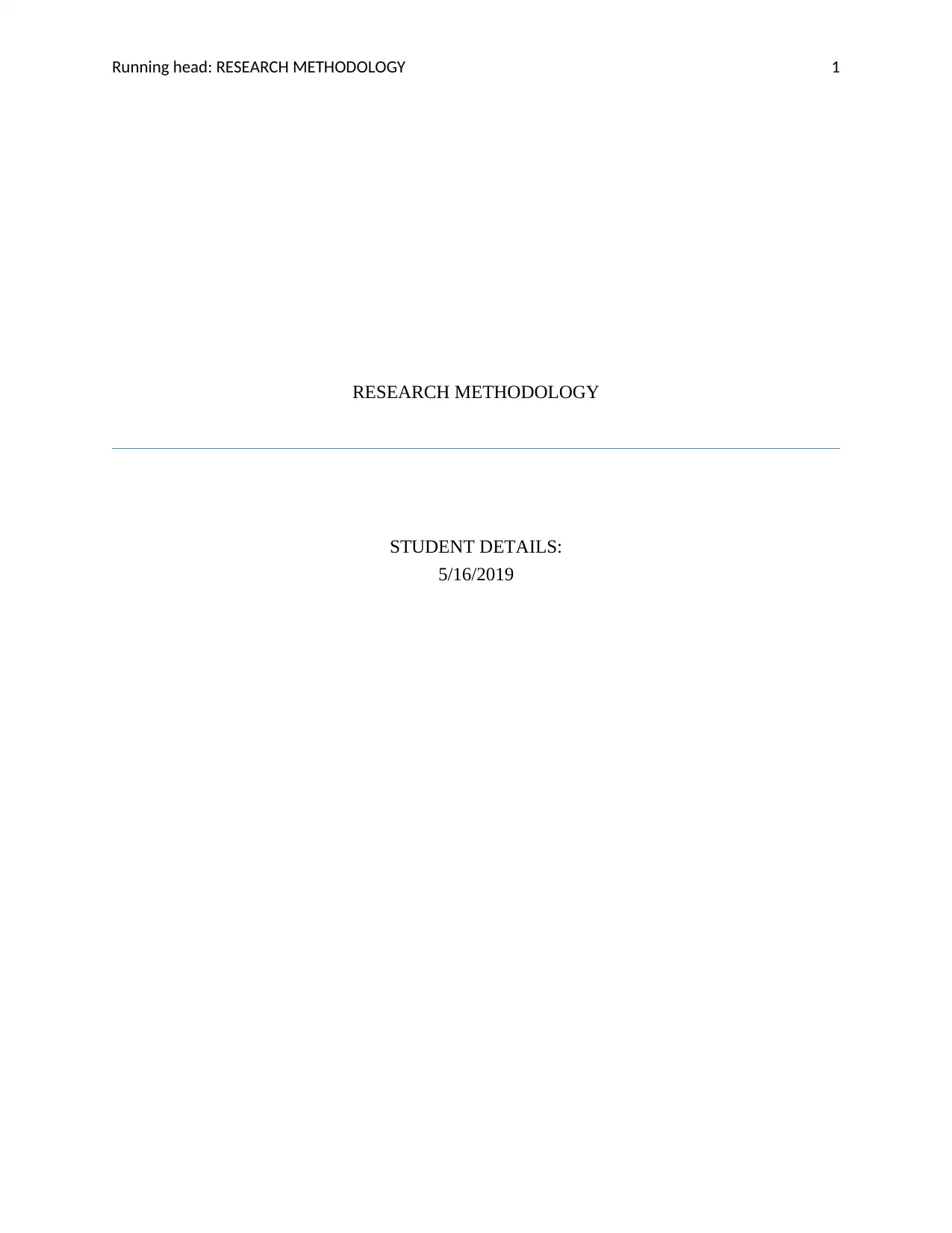
Running head: RESEARCH METHODOLOGY 1
RESEARCH METHODOLOGY
STUDENT DETAILS:
5/16/2019
RESEARCH METHODOLOGY
STUDENT DETAILS:
5/16/2019
Paraphrase This Document
Need a fresh take? Get an instant paraphrase of this document with our AI Paraphraser
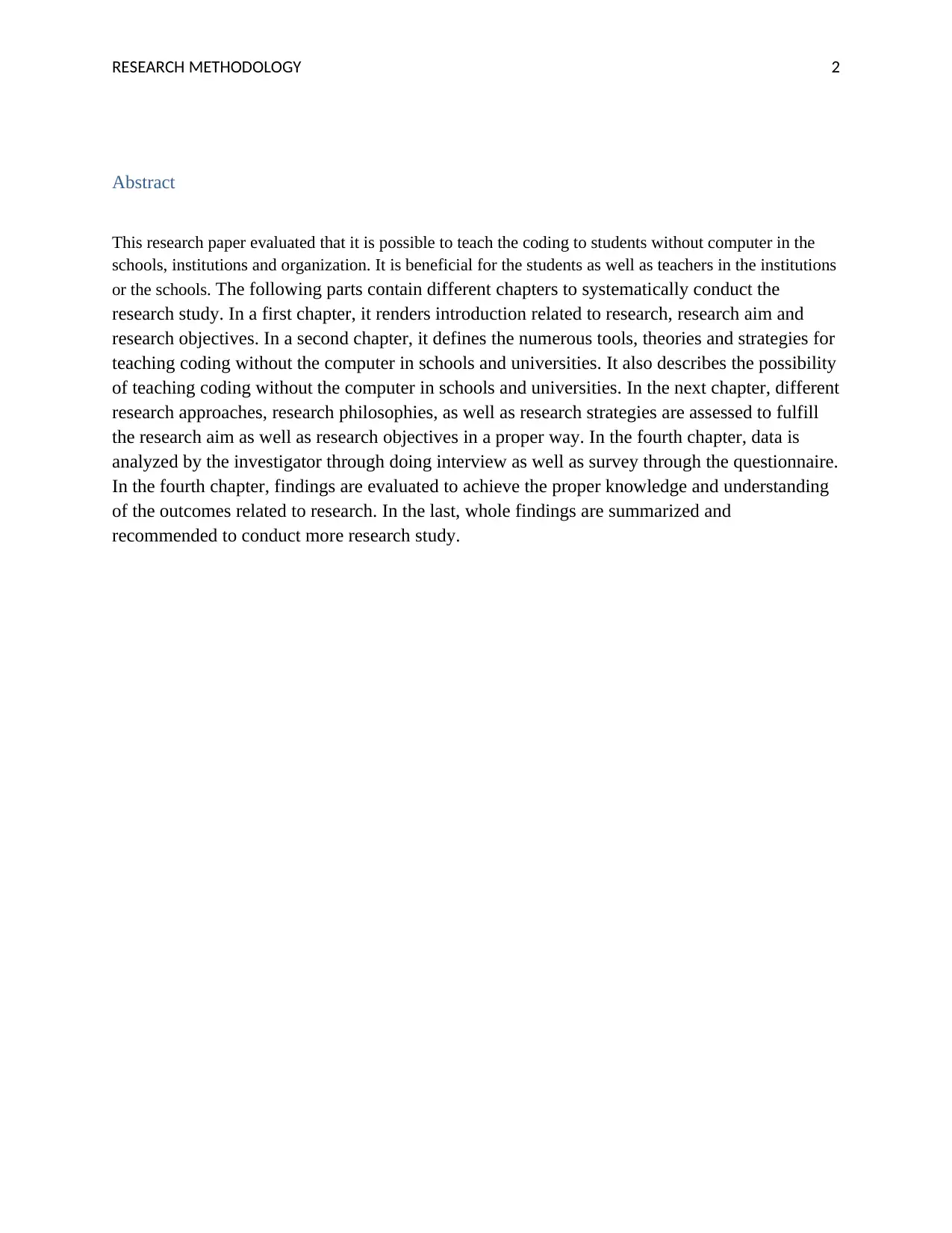
RESEARCH METHODOLOGY 2
Abstract
This research paper evaluated that it is possible to teach the coding to students without computer in the
schools, institutions and organization. It is beneficial for the students as well as teachers in the institutions
or the schools. The following parts contain different chapters to systematically conduct the
research study. In a first chapter, it renders introduction related to research, research aim and
research objectives. In a second chapter, it defines the numerous tools, theories and strategies for
teaching coding without the computer in schools and universities. It also describes the possibility
of teaching coding without the computer in schools and universities. In the next chapter, different
research approaches, research philosophies, as well as research strategies are assessed to fulfill
the research aim as well as research objectives in a proper way. In the fourth chapter, data is
analyzed by the investigator through doing interview as well as survey through the questionnaire.
In the fourth chapter, findings are evaluated to achieve the proper knowledge and understanding
of the outcomes related to research. In the last, whole findings are summarized and
recommended to conduct more research study.
Abstract
This research paper evaluated that it is possible to teach the coding to students without computer in the
schools, institutions and organization. It is beneficial for the students as well as teachers in the institutions
or the schools. The following parts contain different chapters to systematically conduct the
research study. In a first chapter, it renders introduction related to research, research aim and
research objectives. In a second chapter, it defines the numerous tools, theories and strategies for
teaching coding without the computer in schools and universities. It also describes the possibility
of teaching coding without the computer in schools and universities. In the next chapter, different
research approaches, research philosophies, as well as research strategies are assessed to fulfill
the research aim as well as research objectives in a proper way. In the fourth chapter, data is
analyzed by the investigator through doing interview as well as survey through the questionnaire.
In the fourth chapter, findings are evaluated to achieve the proper knowledge and understanding
of the outcomes related to research. In the last, whole findings are summarized and
recommended to conduct more research study.
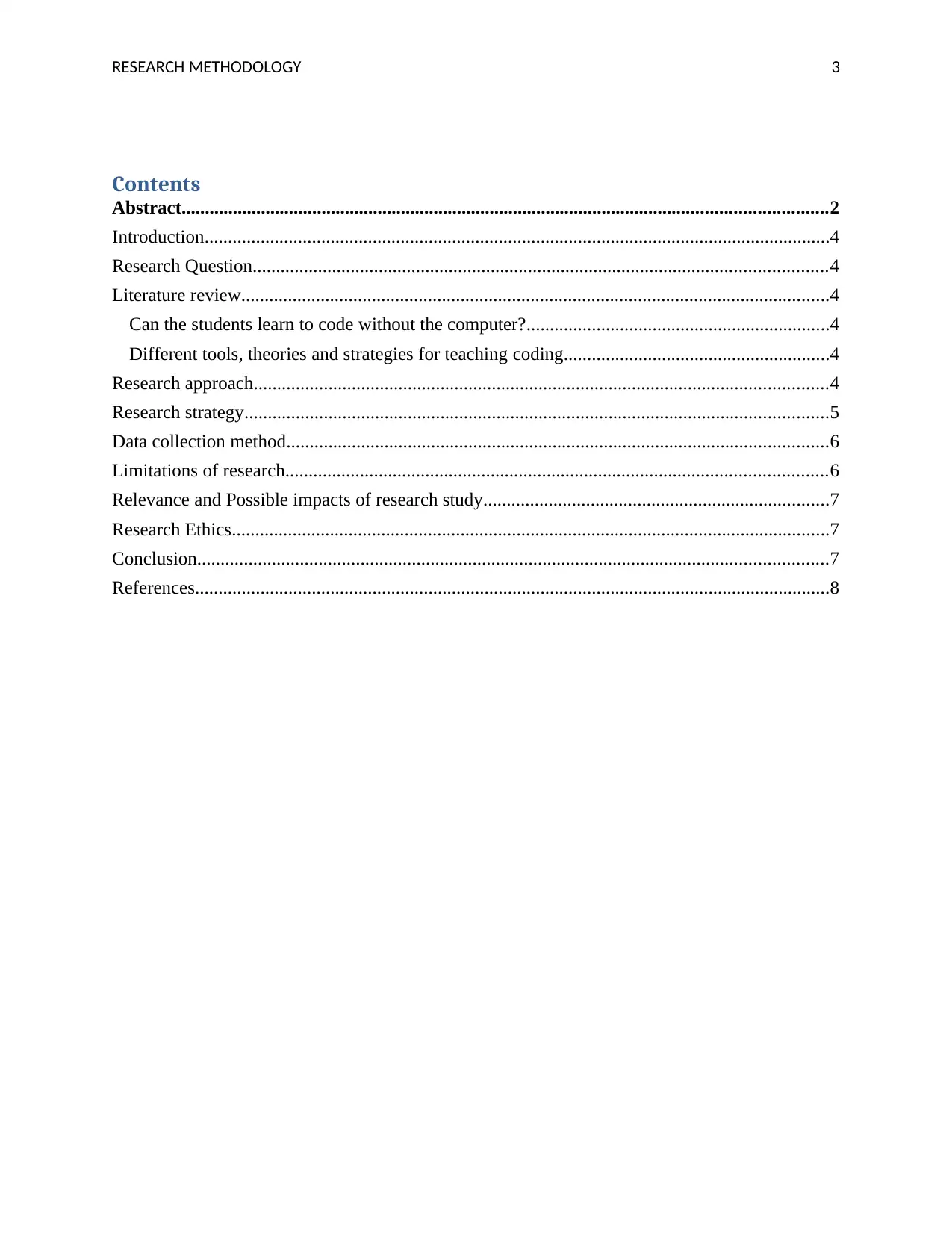
RESEARCH METHODOLOGY 3
Contents
Abstract..........................................................................................................................................2
Introduction......................................................................................................................................4
Research Question...........................................................................................................................4
Literature review..............................................................................................................................4
Can the students learn to code without the computer?.................................................................4
Different tools, theories and strategies for teaching coding.........................................................4
Research approach...........................................................................................................................4
Research strategy.............................................................................................................................5
Data collection method....................................................................................................................6
Limitations of research....................................................................................................................6
Relevance and Possible impacts of research study..........................................................................7
Research Ethics................................................................................................................................7
Conclusion.......................................................................................................................................7
References........................................................................................................................................8
Contents
Abstract..........................................................................................................................................2
Introduction......................................................................................................................................4
Research Question...........................................................................................................................4
Literature review..............................................................................................................................4
Can the students learn to code without the computer?.................................................................4
Different tools, theories and strategies for teaching coding.........................................................4
Research approach...........................................................................................................................4
Research strategy.............................................................................................................................5
Data collection method....................................................................................................................6
Limitations of research....................................................................................................................6
Relevance and Possible impacts of research study..........................................................................7
Research Ethics................................................................................................................................7
Conclusion.......................................................................................................................................7
References........................................................................................................................................8
⊘ This is a preview!⊘
Do you want full access?
Subscribe today to unlock all pages.

Trusted by 1+ million students worldwide
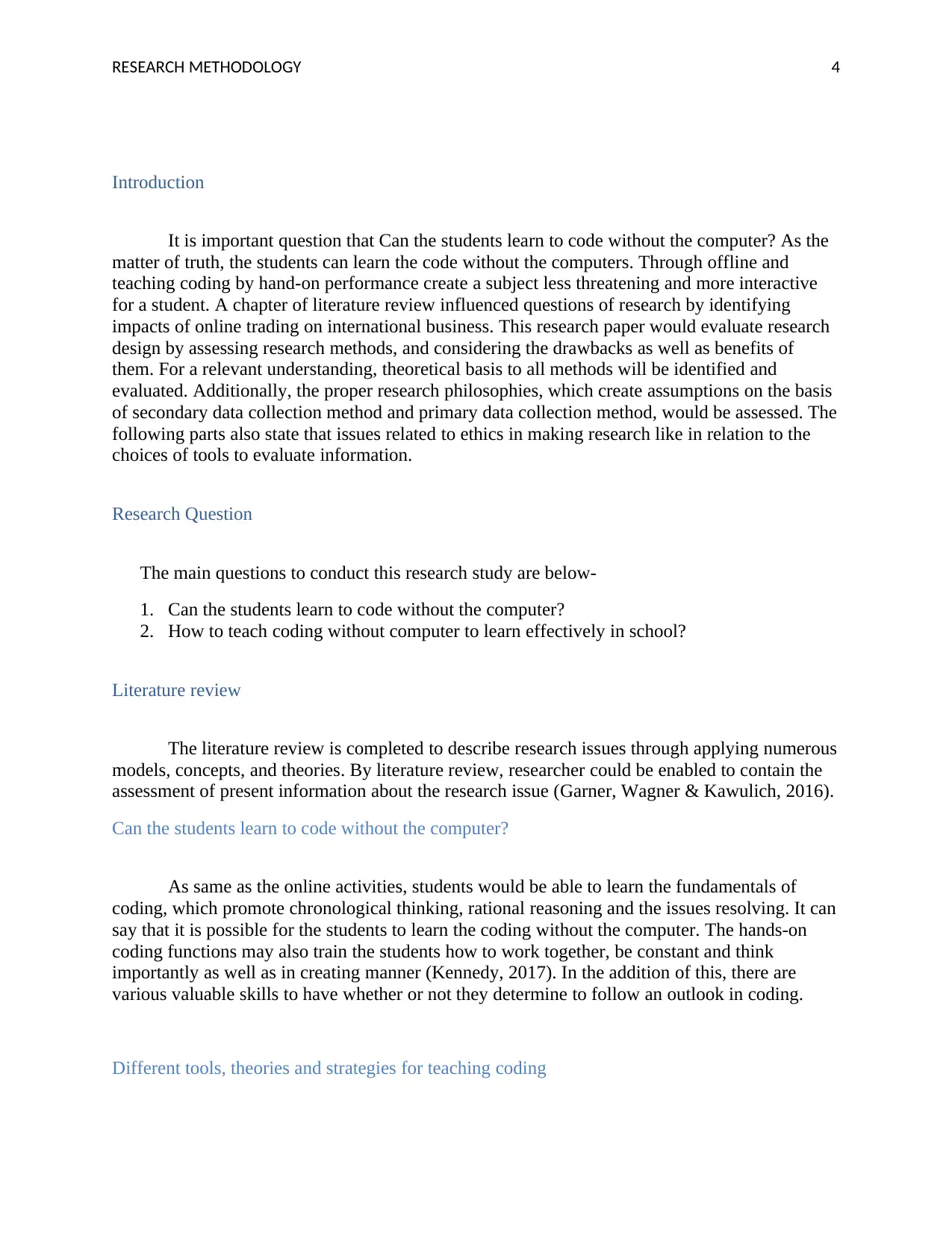
RESEARCH METHODOLOGY 4
Introduction
It is important question that Can the students learn to code without the computer? As the
matter of truth, the students can learn the code without the computers. Through offline and
teaching coding by hand-on performance create a subject less threatening and more interactive
for a student. A chapter of literature review influenced questions of research by identifying
impacts of online trading on international business. This research paper would evaluate research
design by assessing research methods, and considering the drawbacks as well as benefits of
them. For a relevant understanding, theoretical basis to all methods will be identified and
evaluated. Additionally, the proper research philosophies, which create assumptions on the basis
of secondary data collection method and primary data collection method, would be assessed. The
following parts also state that issues related to ethics in making research like in relation to the
choices of tools to evaluate information.
Research Question
The main questions to conduct this research study are below-
1. Can the students learn to code without the computer?
2. How to teach coding without computer to learn effectively in school?
Literature review
The literature review is completed to describe research issues through applying numerous
models, concepts, and theories. By literature review, researcher could be enabled to contain the
assessment of present information about the research issue (Garner, Wagner & Kawulich, 2016).
Can the students learn to code without the computer?
As same as the online activities, students would be able to learn the fundamentals of
coding, which promote chronological thinking, rational reasoning and the issues resolving. It can
say that it is possible for the students to learn the coding without the computer. The hands-on
coding functions may also train the students how to work together, be constant and think
importantly as well as in creating manner (Kennedy, 2017). In the addition of this, there are
various valuable skills to have whether or not they determine to follow an outlook in coding.
Different tools, theories and strategies for teaching coding
Introduction
It is important question that Can the students learn to code without the computer? As the
matter of truth, the students can learn the code without the computers. Through offline and
teaching coding by hand-on performance create a subject less threatening and more interactive
for a student. A chapter of literature review influenced questions of research by identifying
impacts of online trading on international business. This research paper would evaluate research
design by assessing research methods, and considering the drawbacks as well as benefits of
them. For a relevant understanding, theoretical basis to all methods will be identified and
evaluated. Additionally, the proper research philosophies, which create assumptions on the basis
of secondary data collection method and primary data collection method, would be assessed. The
following parts also state that issues related to ethics in making research like in relation to the
choices of tools to evaluate information.
Research Question
The main questions to conduct this research study are below-
1. Can the students learn to code without the computer?
2. How to teach coding without computer to learn effectively in school?
Literature review
The literature review is completed to describe research issues through applying numerous
models, concepts, and theories. By literature review, researcher could be enabled to contain the
assessment of present information about the research issue (Garner, Wagner & Kawulich, 2016).
Can the students learn to code without the computer?
As same as the online activities, students would be able to learn the fundamentals of
coding, which promote chronological thinking, rational reasoning and the issues resolving. It can
say that it is possible for the students to learn the coding without the computer. The hands-on
coding functions may also train the students how to work together, be constant and think
importantly as well as in creating manner (Kennedy, 2017). In the addition of this, there are
various valuable skills to have whether or not they determine to follow an outlook in coding.
Different tools, theories and strategies for teaching coding
Paraphrase This Document
Need a fresh take? Get an instant paraphrase of this document with our AI Paraphraser
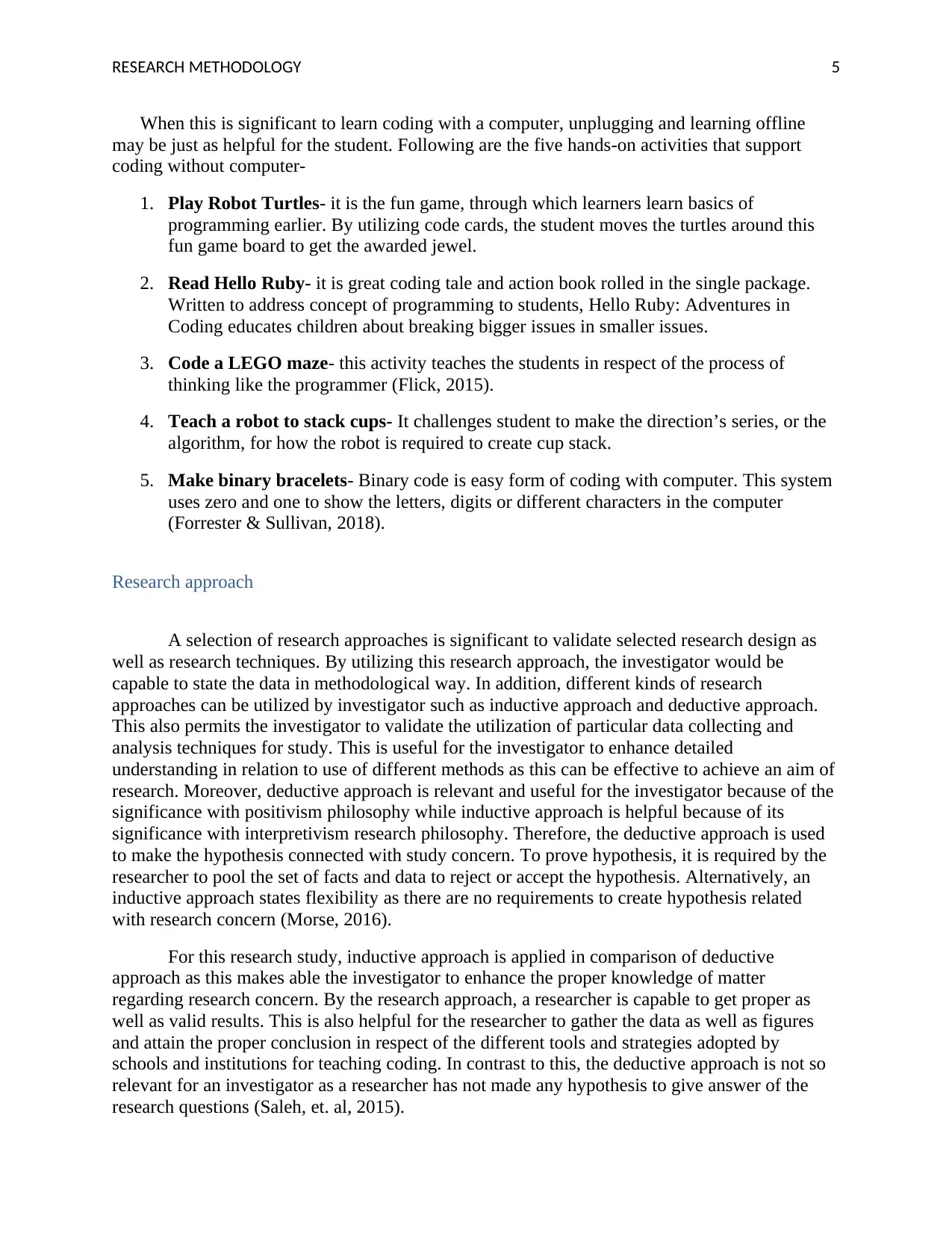
RESEARCH METHODOLOGY 5
When this is significant to learn coding with a computer, unplugging and learning offline
may be just as helpful for the student. Following are the five hands-on activities that support
coding without computer-
1. Play Robot Turtles- it is the fun game, through which learners learn basics of
programming earlier. By utilizing code cards, the student moves the turtles around this
fun game board to get the awarded jewel.
2. Read Hello Ruby- it is great coding tale and action book rolled in the single package.
Written to address concept of programming to students, Hello Ruby: Adventures in
Coding educates children about breaking bigger issues in smaller issues.
3. Code a LEGO maze- this activity teaches the students in respect of the process of
thinking like the programmer (Flick, 2015).
4. Teach a robot to stack cups- It challenges student to make the direction’s series, or the
algorithm, for how the robot is required to create cup stack.
5. Make binary bracelets- Binary code is easy form of coding with computer. This system
uses zero and one to show the letters, digits or different characters in the computer
(Forrester & Sullivan, 2018).
Research approach
A selection of research approaches is significant to validate selected research design as
well as research techniques. By utilizing this research approach, the investigator would be
capable to state the data in methodological way. In addition, different kinds of research
approaches can be utilized by investigator such as inductive approach and deductive approach.
This also permits the investigator to validate the utilization of particular data collecting and
analysis techniques for study. This is useful for the investigator to enhance detailed
understanding in relation to use of different methods as this can be effective to achieve an aim of
research. Moreover, deductive approach is relevant and useful for the investigator because of the
significance with positivism philosophy while inductive approach is helpful because of its
significance with interpretivism research philosophy. Therefore, the deductive approach is used
to make the hypothesis connected with study concern. To prove hypothesis, it is required by the
researcher to pool the set of facts and data to reject or accept the hypothesis. Alternatively, an
inductive approach states flexibility as there are no requirements to create hypothesis related
with research concern (Morse, 2016).
For this research study, inductive approach is applied in comparison of deductive
approach as this makes able the investigator to enhance the proper knowledge of matter
regarding research concern. By the research approach, a researcher is capable to get proper as
well as valid results. This is also helpful for the researcher to gather the data as well as figures
and attain the proper conclusion in respect of the different tools and strategies adopted by
schools and institutions for teaching coding. In contrast to this, the deductive approach is not so
relevant for an investigator as a researcher has not made any hypothesis to give answer of the
research questions (Saleh, et. al, 2015).
When this is significant to learn coding with a computer, unplugging and learning offline
may be just as helpful for the student. Following are the five hands-on activities that support
coding without computer-
1. Play Robot Turtles- it is the fun game, through which learners learn basics of
programming earlier. By utilizing code cards, the student moves the turtles around this
fun game board to get the awarded jewel.
2. Read Hello Ruby- it is great coding tale and action book rolled in the single package.
Written to address concept of programming to students, Hello Ruby: Adventures in
Coding educates children about breaking bigger issues in smaller issues.
3. Code a LEGO maze- this activity teaches the students in respect of the process of
thinking like the programmer (Flick, 2015).
4. Teach a robot to stack cups- It challenges student to make the direction’s series, or the
algorithm, for how the robot is required to create cup stack.
5. Make binary bracelets- Binary code is easy form of coding with computer. This system
uses zero and one to show the letters, digits or different characters in the computer
(Forrester & Sullivan, 2018).
Research approach
A selection of research approaches is significant to validate selected research design as
well as research techniques. By utilizing this research approach, the investigator would be
capable to state the data in methodological way. In addition, different kinds of research
approaches can be utilized by investigator such as inductive approach and deductive approach.
This also permits the investigator to validate the utilization of particular data collecting and
analysis techniques for study. This is useful for the investigator to enhance detailed
understanding in relation to use of different methods as this can be effective to achieve an aim of
research. Moreover, deductive approach is relevant and useful for the investigator because of the
significance with positivism philosophy while inductive approach is helpful because of its
significance with interpretivism research philosophy. Therefore, the deductive approach is used
to make the hypothesis connected with study concern. To prove hypothesis, it is required by the
researcher to pool the set of facts and data to reject or accept the hypothesis. Alternatively, an
inductive approach states flexibility as there are no requirements to create hypothesis related
with research concern (Morse, 2016).
For this research study, inductive approach is applied in comparison of deductive
approach as this makes able the investigator to enhance the proper knowledge of matter
regarding research concern. By the research approach, a researcher is capable to get proper as
well as valid results. This is also helpful for the researcher to gather the data as well as figures
and attain the proper conclusion in respect of the different tools and strategies adopted by
schools and institutions for teaching coding. In contrast to this, the deductive approach is not so
relevant for an investigator as a researcher has not made any hypothesis to give answer of the
research questions (Saleh, et. al, 2015).
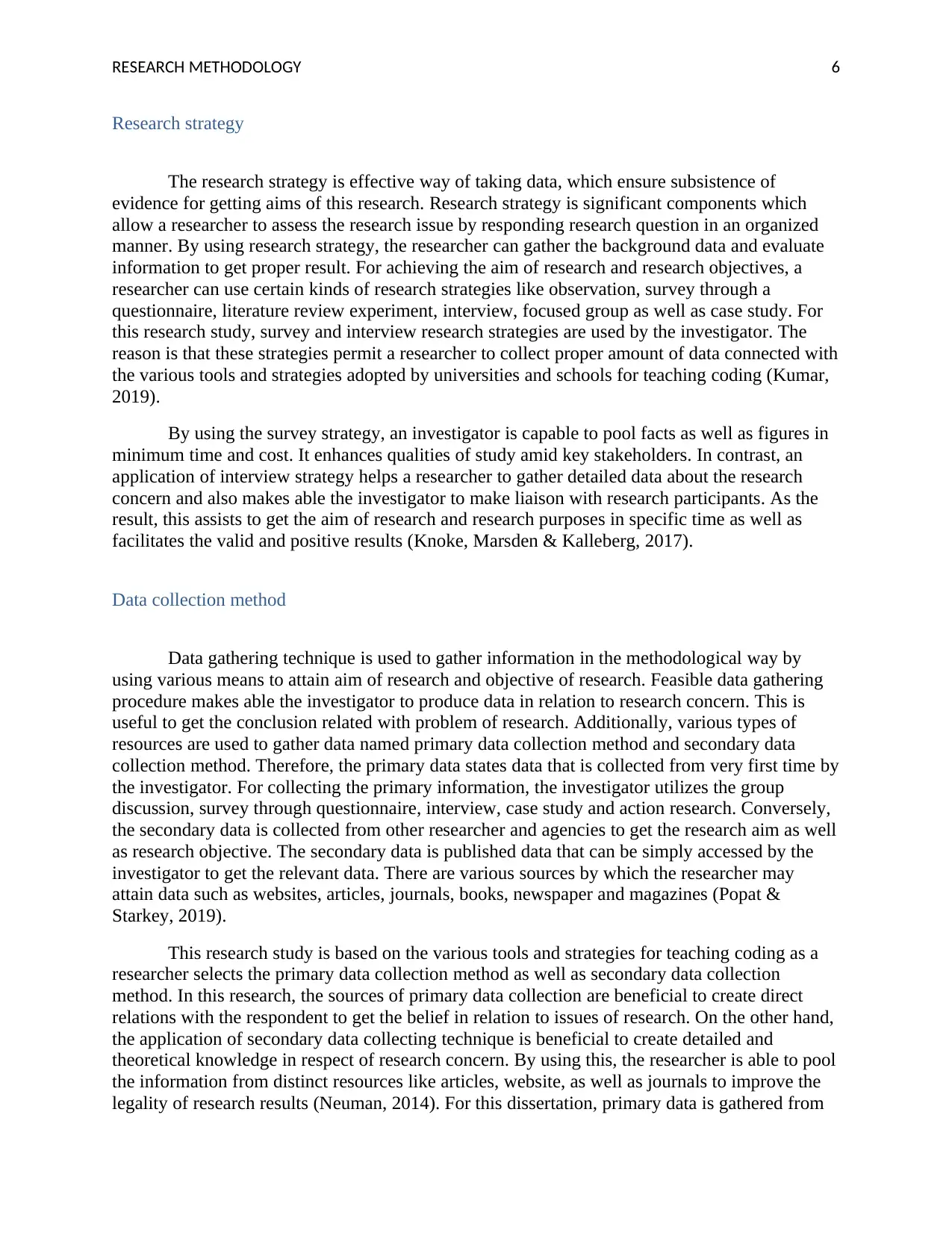
RESEARCH METHODOLOGY 6
Research strategy
The research strategy is effective way of taking data, which ensure subsistence of
evidence for getting aims of this research. Research strategy is significant components which
allow a researcher to assess the research issue by responding research question in an organized
manner. By using research strategy, the researcher can gather the background data and evaluate
information to get proper result. For achieving the aim of research and research objectives, a
researcher can use certain kinds of research strategies like observation, survey through a
questionnaire, literature review experiment, interview, focused group as well as case study. For
this research study, survey and interview research strategies are used by the investigator. The
reason is that these strategies permit a researcher to collect proper amount of data connected with
the various tools and strategies adopted by universities and schools for teaching coding (Kumar,
2019).
By using the survey strategy, an investigator is capable to pool facts as well as figures in
minimum time and cost. It enhances qualities of study amid key stakeholders. In contrast, an
application of interview strategy helps a researcher to gather detailed data about the research
concern and also makes able the investigator to make liaison with research participants. As the
result, this assists to get the aim of research and research purposes in specific time as well as
facilitates the valid and positive results (Knoke, Marsden & Kalleberg, 2017).
Data collection method
Data gathering technique is used to gather information in the methodological way by
using various means to attain aim of research and objective of research. Feasible data gathering
procedure makes able the investigator to produce data in relation to research concern. This is
useful to get the conclusion related with problem of research. Additionally, various types of
resources are used to gather data named primary data collection method and secondary data
collection method. Therefore, the primary data states data that is collected from very first time by
the investigator. For collecting the primary information, the investigator utilizes the group
discussion, survey through questionnaire, interview, case study and action research. Conversely,
the secondary data is collected from other researcher and agencies to get the research aim as well
as research objective. The secondary data is published data that can be simply accessed by the
investigator to get the relevant data. There are various sources by which the researcher may
attain data such as websites, articles, journals, books, newspaper and magazines (Popat &
Starkey, 2019).
This research study is based on the various tools and strategies for teaching coding as a
researcher selects the primary data collection method as well as secondary data collection
method. In this research, the sources of primary data collection are beneficial to create direct
relations with the respondent to get the belief in relation to issues of research. On the other hand,
the application of secondary data collecting technique is beneficial to create detailed and
theoretical knowledge in respect of research concern. By using this, the researcher is able to pool
the information from distinct resources like articles, website, as well as journals to improve the
legality of research results (Neuman, 2014). For this dissertation, primary data is gathered from
Research strategy
The research strategy is effective way of taking data, which ensure subsistence of
evidence for getting aims of this research. Research strategy is significant components which
allow a researcher to assess the research issue by responding research question in an organized
manner. By using research strategy, the researcher can gather the background data and evaluate
information to get proper result. For achieving the aim of research and research objectives, a
researcher can use certain kinds of research strategies like observation, survey through a
questionnaire, literature review experiment, interview, focused group as well as case study. For
this research study, survey and interview research strategies are used by the investigator. The
reason is that these strategies permit a researcher to collect proper amount of data connected with
the various tools and strategies adopted by universities and schools for teaching coding (Kumar,
2019).
By using the survey strategy, an investigator is capable to pool facts as well as figures in
minimum time and cost. It enhances qualities of study amid key stakeholders. In contrast, an
application of interview strategy helps a researcher to gather detailed data about the research
concern and also makes able the investigator to make liaison with research participants. As the
result, this assists to get the aim of research and research purposes in specific time as well as
facilitates the valid and positive results (Knoke, Marsden & Kalleberg, 2017).
Data collection method
Data gathering technique is used to gather information in the methodological way by
using various means to attain aim of research and objective of research. Feasible data gathering
procedure makes able the investigator to produce data in relation to research concern. This is
useful to get the conclusion related with problem of research. Additionally, various types of
resources are used to gather data named primary data collection method and secondary data
collection method. Therefore, the primary data states data that is collected from very first time by
the investigator. For collecting the primary information, the investigator utilizes the group
discussion, survey through questionnaire, interview, case study and action research. Conversely,
the secondary data is collected from other researcher and agencies to get the research aim as well
as research objective. The secondary data is published data that can be simply accessed by the
investigator to get the relevant data. There are various sources by which the researcher may
attain data such as websites, articles, journals, books, newspaper and magazines (Popat &
Starkey, 2019).
This research study is based on the various tools and strategies for teaching coding as a
researcher selects the primary data collection method as well as secondary data collection
method. In this research, the sources of primary data collection are beneficial to create direct
relations with the respondent to get the belief in relation to issues of research. On the other hand,
the application of secondary data collecting technique is beneficial to create detailed and
theoretical knowledge in respect of research concern. By using this, the researcher is able to pool
the information from distinct resources like articles, website, as well as journals to improve the
legality of research results (Neuman, 2014). For this dissertation, primary data is gathered from
⊘ This is a preview!⊘
Do you want full access?
Subscribe today to unlock all pages.

Trusted by 1+ million students worldwide
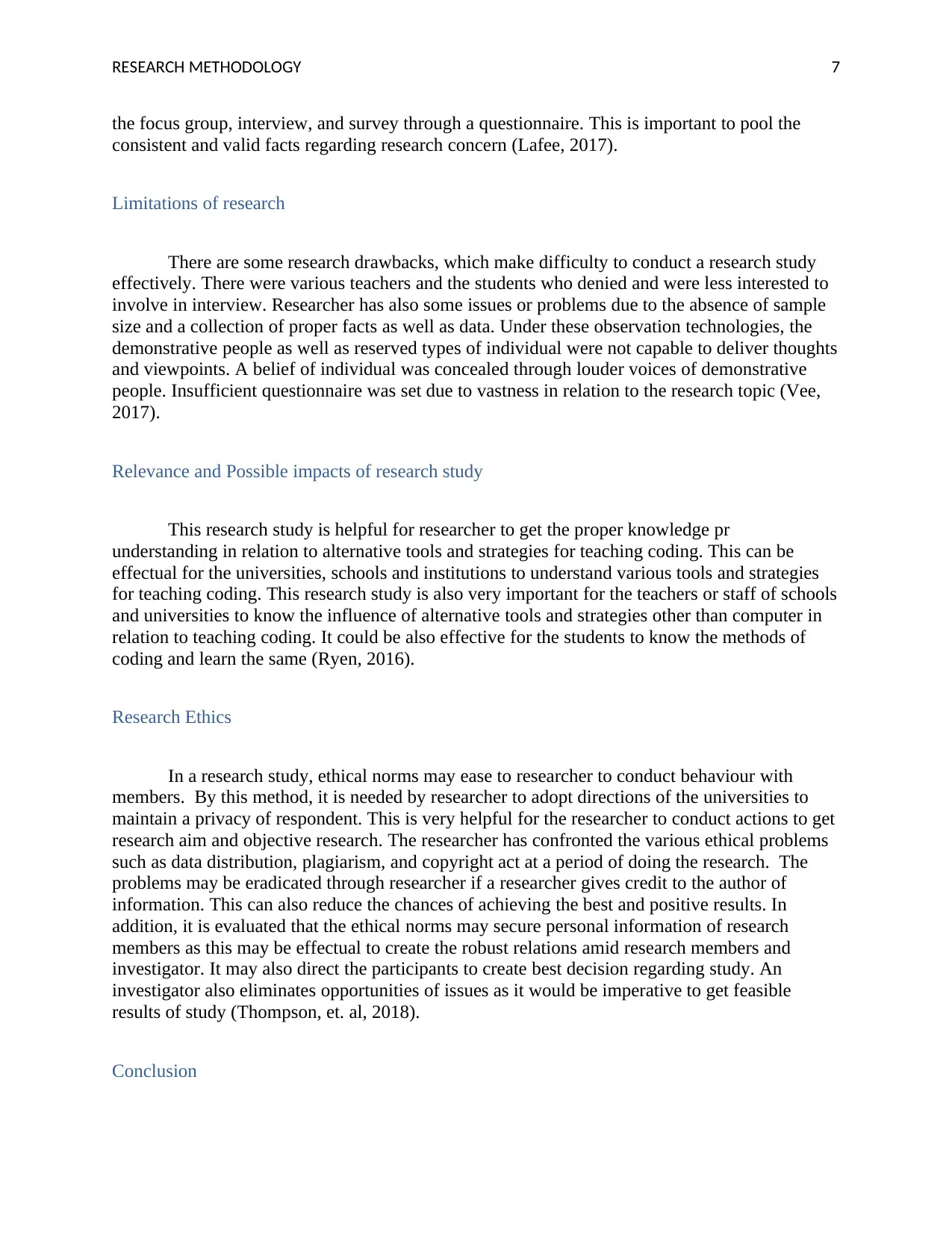
RESEARCH METHODOLOGY 7
the focus group, interview, and survey through a questionnaire. This is important to pool the
consistent and valid facts regarding research concern (Lafee, 2017).
Limitations of research
There are some research drawbacks, which make difficulty to conduct a research study
effectively. There were various teachers and the students who denied and were less interested to
involve in interview. Researcher has also some issues or problems due to the absence of sample
size and a collection of proper facts as well as data. Under these observation technologies, the
demonstrative people as well as reserved types of individual were not capable to deliver thoughts
and viewpoints. A belief of individual was concealed through louder voices of demonstrative
people. Insufficient questionnaire was set due to vastness in relation to the research topic (Vee,
2017).
Relevance and Possible impacts of research study
This research study is helpful for researcher to get the proper knowledge pr
understanding in relation to alternative tools and strategies for teaching coding. This can be
effectual for the universities, schools and institutions to understand various tools and strategies
for teaching coding. This research study is also very important for the teachers or staff of schools
and universities to know the influence of alternative tools and strategies other than computer in
relation to teaching coding. It could be also effective for the students to know the methods of
coding and learn the same (Ryen, 2016).
Research Ethics
In a research study, ethical norms may ease to researcher to conduct behaviour with
members. By this method, it is needed by researcher to adopt directions of the universities to
maintain a privacy of respondent. This is very helpful for the researcher to conduct actions to get
research aim and objective research. The researcher has confronted the various ethical problems
such as data distribution, plagiarism, and copyright act at a period of doing the research. The
problems may be eradicated through researcher if a researcher gives credit to the author of
information. This can also reduce the chances of achieving the best and positive results. In
addition, it is evaluated that the ethical norms may secure personal information of research
members as this may be effectual to create the robust relations amid research members and
investigator. It may also direct the participants to create best decision regarding study. An
investigator also eliminates opportunities of issues as it would be imperative to get feasible
results of study (Thompson, et. al, 2018).
Conclusion
the focus group, interview, and survey through a questionnaire. This is important to pool the
consistent and valid facts regarding research concern (Lafee, 2017).
Limitations of research
There are some research drawbacks, which make difficulty to conduct a research study
effectively. There were various teachers and the students who denied and were less interested to
involve in interview. Researcher has also some issues or problems due to the absence of sample
size and a collection of proper facts as well as data. Under these observation technologies, the
demonstrative people as well as reserved types of individual were not capable to deliver thoughts
and viewpoints. A belief of individual was concealed through louder voices of demonstrative
people. Insufficient questionnaire was set due to vastness in relation to the research topic (Vee,
2017).
Relevance and Possible impacts of research study
This research study is helpful for researcher to get the proper knowledge pr
understanding in relation to alternative tools and strategies for teaching coding. This can be
effectual for the universities, schools and institutions to understand various tools and strategies
for teaching coding. This research study is also very important for the teachers or staff of schools
and universities to know the influence of alternative tools and strategies other than computer in
relation to teaching coding. It could be also effective for the students to know the methods of
coding and learn the same (Ryen, 2016).
Research Ethics
In a research study, ethical norms may ease to researcher to conduct behaviour with
members. By this method, it is needed by researcher to adopt directions of the universities to
maintain a privacy of respondent. This is very helpful for the researcher to conduct actions to get
research aim and objective research. The researcher has confronted the various ethical problems
such as data distribution, plagiarism, and copyright act at a period of doing the research. The
problems may be eradicated through researcher if a researcher gives credit to the author of
information. This can also reduce the chances of achieving the best and positive results. In
addition, it is evaluated that the ethical norms may secure personal information of research
members as this may be effectual to create the robust relations amid research members and
investigator. It may also direct the participants to create best decision regarding study. An
investigator also eliminates opportunities of issues as it would be imperative to get feasible
results of study (Thompson, et. al, 2018).
Conclusion
Paraphrase This Document
Need a fresh take? Get an instant paraphrase of this document with our AI Paraphraser
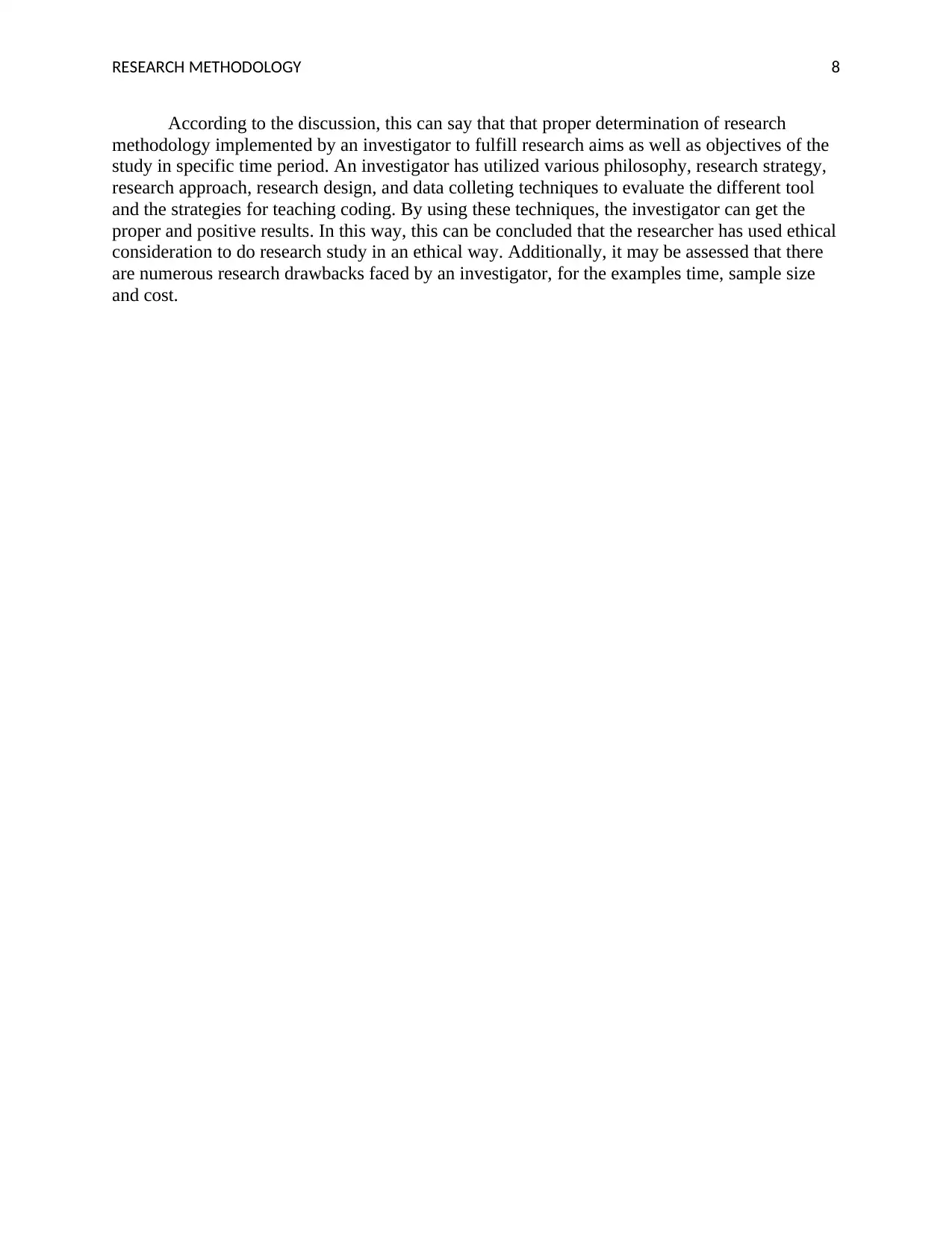
RESEARCH METHODOLOGY 8
According to the discussion, this can say that that proper determination of research
methodology implemented by an investigator to fulfill research aims as well as objectives of the
study in specific time period. An investigator has utilized various philosophy, research strategy,
research approach, research design, and data colleting techniques to evaluate the different tool
and the strategies for teaching coding. By using these techniques, the investigator can get the
proper and positive results. In this way, this can be concluded that the researcher has used ethical
consideration to do research study in an ethical way. Additionally, it may be assessed that there
are numerous research drawbacks faced by an investigator, for the examples time, sample size
and cost.
According to the discussion, this can say that that proper determination of research
methodology implemented by an investigator to fulfill research aims as well as objectives of the
study in specific time period. An investigator has utilized various philosophy, research strategy,
research approach, research design, and data colleting techniques to evaluate the different tool
and the strategies for teaching coding. By using these techniques, the investigator can get the
proper and positive results. In this way, this can be concluded that the researcher has used ethical
consideration to do research study in an ethical way. Additionally, it may be assessed that there
are numerous research drawbacks faced by an investigator, for the examples time, sample size
and cost.
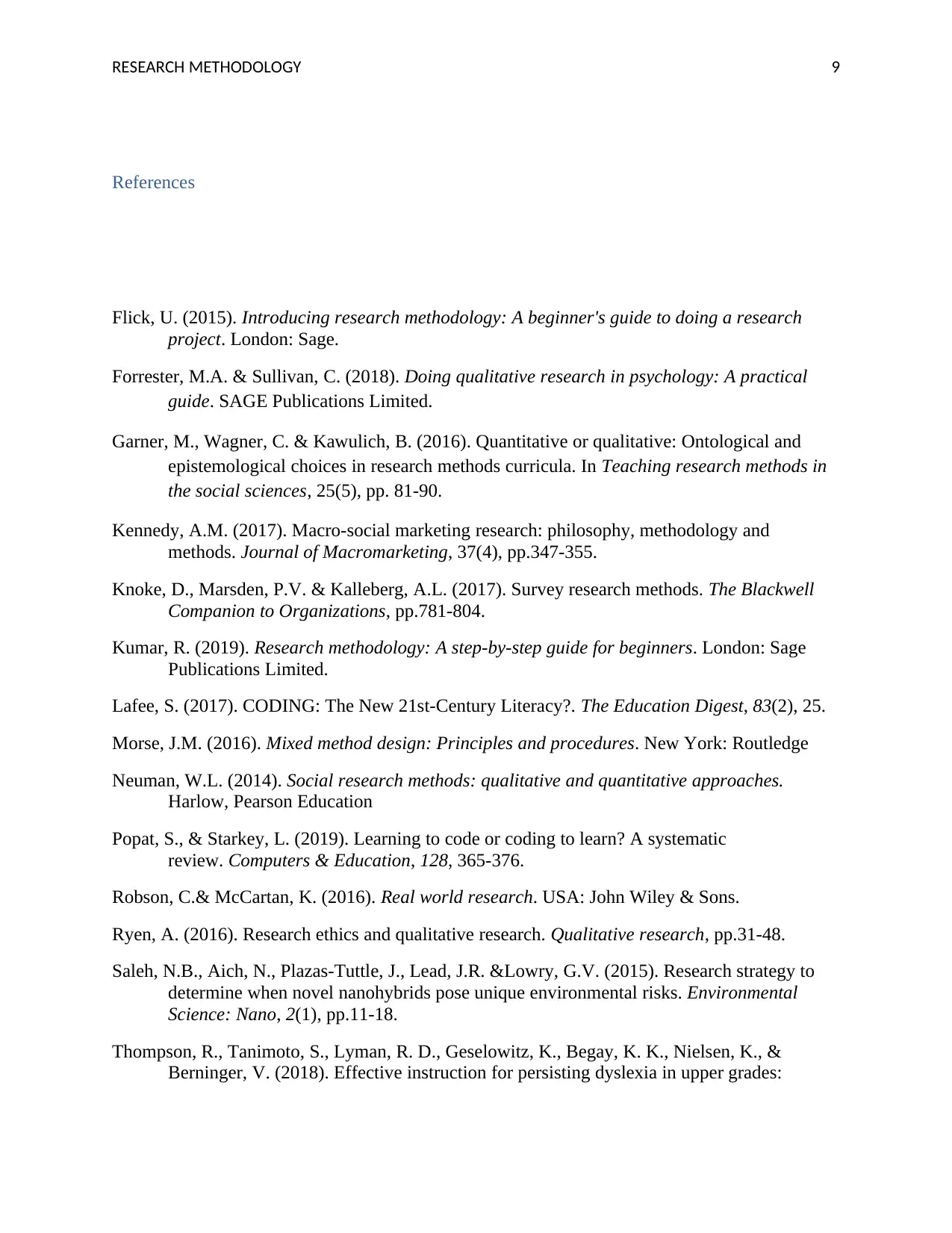
RESEARCH METHODOLOGY 9
References
Flick, U. (2015). Introducing research methodology: A beginner's guide to doing a research
project. London: Sage.
Forrester, M.A. & Sullivan, C. (2018). Doing qualitative research in psychology: A practical
guide. SAGE Publications Limited.
Garner, M., Wagner, C. & Kawulich, B. (2016). Quantitative or qualitative: Ontological and
epistemological choices in research methods curricula. In Teaching research methods in
the social sciences, 25(5), pp. 81-90.
Kennedy, A.M. (2017). Macro-social marketing research: philosophy, methodology and
methods. Journal of Macromarketing, 37(4), pp.347-355.
Knoke, D., Marsden, P.V. & Kalleberg, A.L. (2017). Survey research methods. The Blackwell
Companion to Organizations, pp.781-804.
Kumar, R. (2019). Research methodology: A step-by-step guide for beginners. London: Sage
Publications Limited.
Lafee, S. (2017). CODING: The New 21st-Century Literacy?. The Education Digest, 83(2), 25.
Morse, J.M. (2016). Mixed method design: Principles and procedures. New York: Routledge
Neuman, W.L. (2014). Social research methods: qualitative and quantitative approaches.
Harlow, Pearson Education
Popat, S., & Starkey, L. (2019). Learning to code or coding to learn? A systematic
review. Computers & Education, 128, 365-376.
Robson, C.& McCartan, K. (2016). Real world research. USA: John Wiley & Sons.
Ryen, A. (2016). Research ethics and qualitative research. Qualitative research, pp.31-48.
Saleh, N.B., Aich, N., Plazas-Tuttle, J., Lead, J.R. &Lowry, G.V. (2015). Research strategy to
determine when novel nanohybrids pose unique environmental risks. Environmental
Science: Nano, 2(1), pp.11-18.
Thompson, R., Tanimoto, S., Lyman, R. D., Geselowitz, K., Begay, K. K., Nielsen, K., &
Berninger, V. (2018). Effective instruction for persisting dyslexia in upper grades:
References
Flick, U. (2015). Introducing research methodology: A beginner's guide to doing a research
project. London: Sage.
Forrester, M.A. & Sullivan, C. (2018). Doing qualitative research in psychology: A practical
guide. SAGE Publications Limited.
Garner, M., Wagner, C. & Kawulich, B. (2016). Quantitative or qualitative: Ontological and
epistemological choices in research methods curricula. In Teaching research methods in
the social sciences, 25(5), pp. 81-90.
Kennedy, A.M. (2017). Macro-social marketing research: philosophy, methodology and
methods. Journal of Macromarketing, 37(4), pp.347-355.
Knoke, D., Marsden, P.V. & Kalleberg, A.L. (2017). Survey research methods. The Blackwell
Companion to Organizations, pp.781-804.
Kumar, R. (2019). Research methodology: A step-by-step guide for beginners. London: Sage
Publications Limited.
Lafee, S. (2017). CODING: The New 21st-Century Literacy?. The Education Digest, 83(2), 25.
Morse, J.M. (2016). Mixed method design: Principles and procedures. New York: Routledge
Neuman, W.L. (2014). Social research methods: qualitative and quantitative approaches.
Harlow, Pearson Education
Popat, S., & Starkey, L. (2019). Learning to code or coding to learn? A systematic
review. Computers & Education, 128, 365-376.
Robson, C.& McCartan, K. (2016). Real world research. USA: John Wiley & Sons.
Ryen, A. (2016). Research ethics and qualitative research. Qualitative research, pp.31-48.
Saleh, N.B., Aich, N., Plazas-Tuttle, J., Lead, J.R. &Lowry, G.V. (2015). Research strategy to
determine when novel nanohybrids pose unique environmental risks. Environmental
Science: Nano, 2(1), pp.11-18.
Thompson, R., Tanimoto, S., Lyman, R. D., Geselowitz, K., Begay, K. K., Nielsen, K., &
Berninger, V. (2018). Effective instruction for persisting dyslexia in upper grades:
⊘ This is a preview!⊘
Do you want full access?
Subscribe today to unlock all pages.

Trusted by 1+ million students worldwide

RESEARCH METHODOLOGY 10
Adding hope stories and computer coding to explicit literacy instruction. Education and
information technologies, 23(3), 1043-1068.
Vee, A. (2017). Coding literacy: How computer programming is changing writing. Cambridge:
Mit Press.
Adding hope stories and computer coding to explicit literacy instruction. Education and
information technologies, 23(3), 1043-1068.
Vee, A. (2017). Coding literacy: How computer programming is changing writing. Cambridge:
Mit Press.
1 out of 10
Related Documents
Your All-in-One AI-Powered Toolkit for Academic Success.
+13062052269
info@desklib.com
Available 24*7 on WhatsApp / Email
![[object Object]](/_next/static/media/star-bottom.7253800d.svg)
Unlock your academic potential
Copyright © 2020–2026 A2Z Services. All Rights Reserved. Developed and managed by ZUCOL.





